Disclosure: This article contains affiliate links. We may earn a commission from purchases at no extra cost to you, which helps our travel content.
Standing at the confluence of the Rhône and Saône rivers, Lyon has been France's culinary heart for centuries—a fact I've come to appreciate deeply over multiple visits spanning two decades. While Paris may claim the spotlight, Lyon holds the soul of French gastronomy in its cobblestone streets and centuries-old kitchens. My first encounter with a proper Lyonnaise bouchon in 1998 fundamentally altered my understanding of what food could be: not merely sustenance, but a profound cultural expression. This fall, Elena and I returned for our fourth extended stay, embarking on a weeklong journey through the city's evolving culinary landscape. From the rustic, unapologetic traditions of its bouchons to the refined artistry of its Michelin-starred establishments, Lyon offers a gastronomic pilgrimage unlike any other in Europe—perhaps the world.
Understanding Lyon's Bouchons: The Soul of Lyonnaise Cuisine
To truly know Lyon is to dine in its bouchons—those intimate, family-run establishments where recipes have been passed down through generations like precious heirlooms. These are not mere restaurants but cultural institutions, where red-and-white checkered tablecloths and communal seating create the stage for Lyon's most authentic culinary theater.
On our second evening, we secured a corner table at Daniel et Denise, one of the city's most respected certified bouchons. Chef Joseph Viola's mastery of traditional Lyonnaise cuisine exemplifies why these establishments remain sacred to locals. The tablier de sapeur (breaded tripe) arrived crisp and golden, accompanied by a sauce gribiche that transformed this humble offal dish into something transcendent. Elena, initially hesitant, found herself converted by the third bite.
What distinguishes authentic bouchons is their unwavering commitment to nose-to-tail cooking—a practice born of necessity centuries ago that now stands as a testament to sustainability. Dishes like cervelle de canut (seasoned fresh cheese whose name translates amusingly to 'silk worker's brain') and boudin noir aux pommes (blood sausage with apples) might challenge the uninitiated, but they represent the ingenious ways Lyonnaise cuisine elevates simple ingredients.
Before visiting Lyon, I recommend investing in a quality food guide to understand the historical and cultural context of these establishments. The nuances between certified bouchons (displaying the 'Authentique Bouchon Lyonnais' label) and tourist-oriented imitations can make the difference between an authentic experience and a forgettable meal.
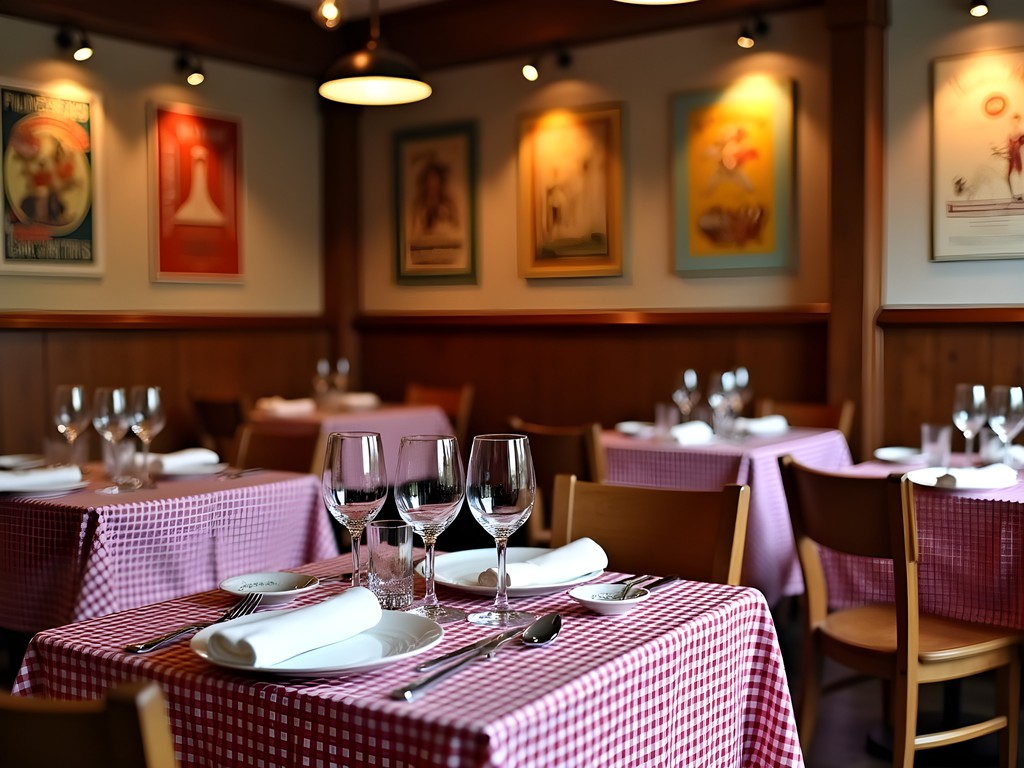
💡 Pro Tips
- Reserve bouchon tables at least two weeks in advance, particularly for dinner service
- Look for the 'Authentique Bouchon Lyonnais' certification label at the entrance
- Order the 'menu du jour' for the most authentic and seasonal experience
Les Halles de Lyon Paul Bocuse: A Temple of Ingredients
Any serious exploration of Lyon's gastronomy must include a morning at Les Halles de Lyon Paul Bocuse, the city's premier covered market named after its most celebrated culinary son. I make it a ritual to arrive by 9:00 AM, when the morning light streams through the windows and vendors are arranging their displays with an artistry that borders on the devotional.
During our recent visit, Elena and I spent three hours wandering the aisles, moving from the pungent cheese displays at Mère Richard (where the Saint-Marcellin ages to creamy perfection) to the hypnotic array of charcuterie at Sibilia, where fifth-generation artisans continue traditions dating back to 1925. The visual spectacle alone justifies the visit—mountains of pink praline tarts, glistening quenelles, and jewel-like chocolates create a sensory experience that epitomizes French dedication to culinary excellence.
What makes Les Halles extraordinary is the opportunity to not only purchase exceptional ingredients but to dine among them. We settled at a marble-topped table at Chez Léon for freshly shucked oysters from Brittany and glasses of Mâconnais white wine. The proximity to both producers and chefs shopping for their restaurants creates an atmosphere of shared appreciation that transcends the typical market experience.
For those looking to bring home culinary souvenirs, I've found no better investment than a insulated market tote which allows you to safely transport cheeses and charcuterie back to your accommodations for an impromptu picnic. The market's vendors are accustomed to vacuum-sealing items for travelers—simply mention you're transporting the goods, and they'll ensure everything is properly prepared for travel.
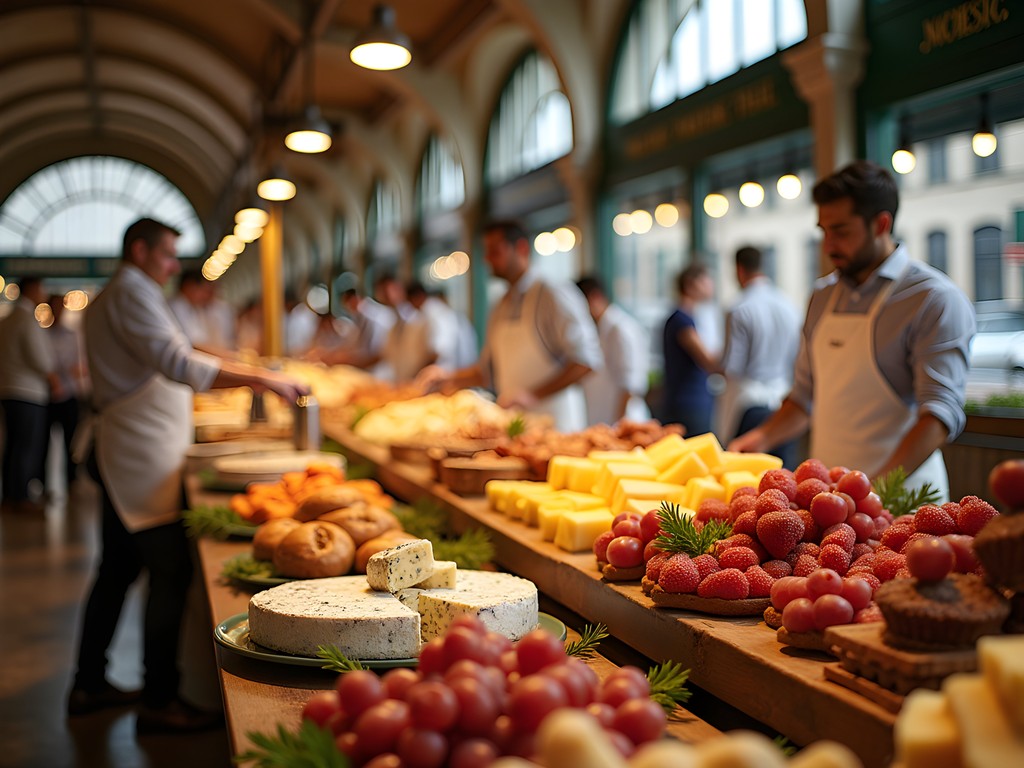
💡 Pro Tips
- Visit on weekday mornings to avoid weekend crowds and see chefs selecting ingredients for their restaurants
- Many vendors offer small tastings—don't hesitate to express interest and ask questions
- Save room for a seated meal at one of the market's many dining counters
The Legacy of Paul Bocuse: Experiencing L'Auberge du Pont de Collonges
No culinary journey to Lyon would be complete without paying homage to Paul Bocuse, the chef who revolutionized French cuisine and put Lyon firmly on the global gastronomic map. His flagship restaurant, L'Auberge du Pont de Collonges (commonly known as "Paul Bocuse"), sits just outside the city center and remains one of France's most iconic dining destinations even after the master's passing in 2018.
During our recent visit, Elena and I reserved a Thursday evening table—a special occasion marking our anniversary. The experience begins before you even enter, as the building's striking blue façade and Bocuse's unmistakable silhouette painted across it announce that this is no ordinary restaurant but a temple to French gastronomy.
Inside, the dining room maintains its classic décor—plush red upholstery, gleaming silverware, and formal service that feels increasingly rare in today's casual dining landscape. The menu continues to feature Bocuse's signature dishes: the transcendent truffle soup V.G.E. (created for President Valéry Giscard d'Estaing in 1975) arrives sealed under a dome of puff pastry, releasing an intoxicating aroma when pierced tableside. His famed Bresse chicken cooked in a bladder (poulet de Bresse en vessie) demonstrates the technical mastery that defined Bocuse's approach—traditional techniques elevated to their highest expression.
While the €265 prix fixe represents significant investment, it delivers not merely a meal but a cultural experience—a direct connection to the chef who transformed French cuisine from rigid classicism to the more ingredient-focused, technically precise approach that influences chefs globally today. For serious food enthusiasts, it's akin to visiting the Louvre—essential cultural context.
To fully appreciate the experience, I recommend preparing by reading Paul Bocuse biography, which provides fascinating context about how this son of a restaurateur came to reshape global gastronomy while remaining deeply rooted in his beloved Lyon.
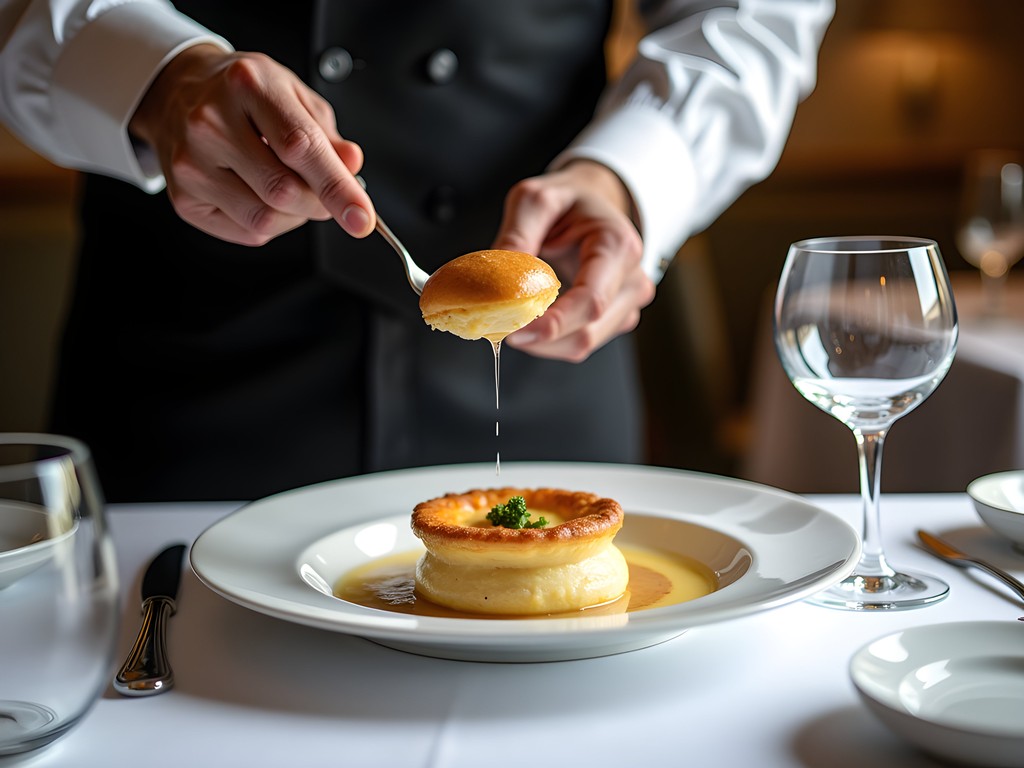
💡 Pro Tips
- Reserve at least two months in advance for dinner and specify any special occasions
- The lunch service offers the same experience at a slightly reduced price point
- Request a tour of the kitchen at the end of your meal—often graciously accommodated
Beyond Tradition: Lyon's New Gastronomic Wave
While Lyon's culinary reputation was built on its bouchons and classic institutions, the city has undergone a remarkable evolution in recent years. A new generation of chefs—many trained under the masters but eager to forge their own paths—has created a dynamic contemporary scene that honors tradition while embracing global influences and innovative techniques.
During our week, we made a point of exploring this new wave, beginning with Les Apothicaires, where Chef Tabata Mey (originally from Brazil) and her husband Ludovic create dishes that beautifully bridge South American and French techniques. Their tasting menu featured a remarkable reinterpretation of moqueca using local river fish and regional herbs—a perfect example of how Lyon's new guard respectfully incorporates global influences.
Perhaps most exciting is Lyon's emergence as a natural wine destination. At Le Dépanneur, we discovered a wine bar that could easily hold its own in Copenhagen or New York, featuring an extensive selection of low-intervention wines from small producers throughout France. The young sommelier guided us through a flight of Beaujolais crus that demonstrated why this nearby wine region is experiencing such renewed interest among serious oenophiles.
For those seeking to explore Lyon's contemporary dining scene, I've found the wine journal invaluable for understanding the regional wines that pair beautifully with both traditional and modern Lyonnaise cuisine. The sections on Beaujolais and Northern Rhône wines provide excellent context for the bottles you'll encounter throughout the city.
What makes Lyon's culinary evolution so compelling is that it doesn't reject tradition but builds upon it. At Café Sillon, Chef Mathieu Rostaing-Tayard creates dishes that might initially appear simple but reveal themselves to be technically sophisticated reinterpretations of Lyonnaise classics. His pike quenelles—traditionally heavy and sauce-laden—arrive as an ethereal mousse paired with seasonal vegetables and herbs foraged from the banks of the Saône.
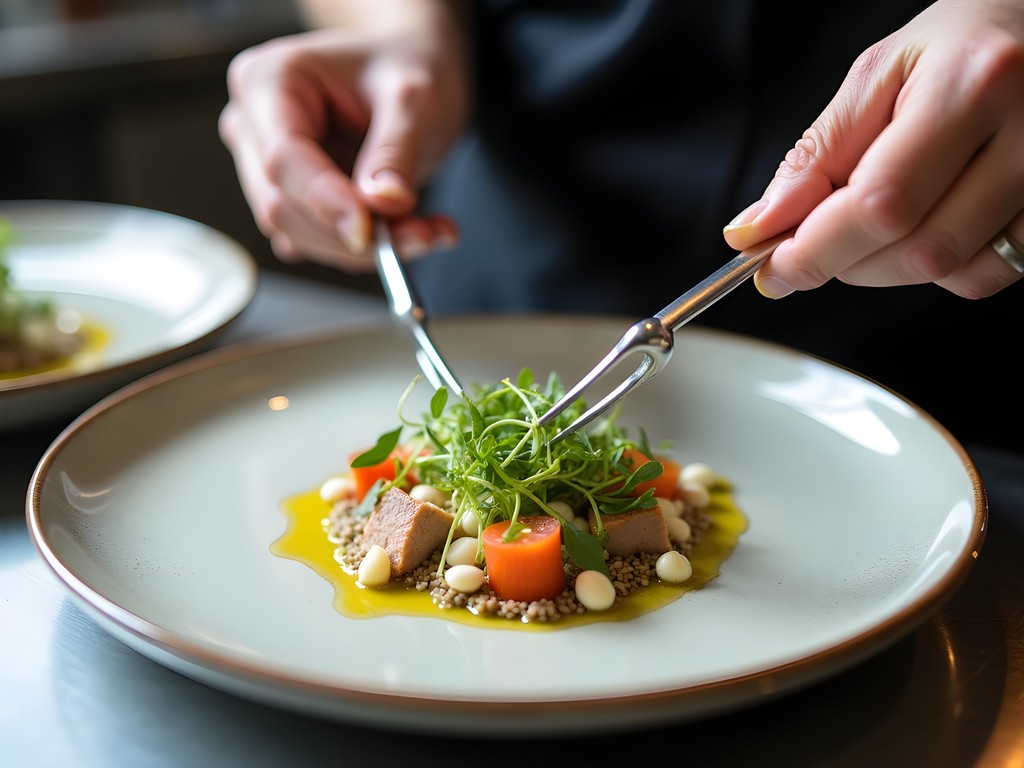
💡 Pro Tips
- Book modern restaurants further in advance than traditional ones—they typically have fewer tables
- Look for the 'Jeunes Restaurateurs' designation, which often indicates innovative chefs committed to quality
- Ask for wine pairings—Lyon's sommeliers excel at showcasing small, local producers
The Art of the Long Lunch: Lyon's Midday Dining Culture
Perhaps no aspect of Lyon's food culture better exemplifies its philosophy than the institution of the long lunch. While much of the modern world has reduced midday meals to hurried affairs consumed at desks, Lyon steadfastly preserves the art of the proper déjeuner—a cultural practice I've grown to cherish and attempt to emulate even back home in Reno.
On Wednesday, we experienced this tradition at its finest at Le Garet, a bouchon where businesspeople, retirees, and visitors alike converged at 12:30 PM for a two-hour celebration of food and conversation. The prix fixe lunch (a remarkable value at €28 for three courses) began with pâté en croûte—a specialty of Lyon featuring game meats encased in golden pastry—followed by a main course of tender braised beef cheeks in red wine sauce. The meal concluded with a Saint-Marcellin cheese so perfectly ripened it practically flowed across the plate.
What struck me most was the democratic nature of these lunches. At neighboring tables sat both workers in casual attire and executives in tailored suits, all adhering to the unspoken agreement that lunch deserves proper time and attention. Bottles of Côtes du Rhône were shared, phones remained largely absent, and conversations flowed as generously as the wine.
For visitors unaccustomed to this rhythm, I recommend bringing along a pocket notebook to jot down observations, memorable flavors, or wine recommendations. These lunches provide not just nourishment but cultural insights that deserve recording.
The practical benefit for travelers is that embracing this midday main meal allows you to experience Lyon's finest cuisine at significantly lower prices than dinner service. Many restaurants that might strain the budget in the evening offer the same quality and attention to detail at lunch for nearly half the cost.
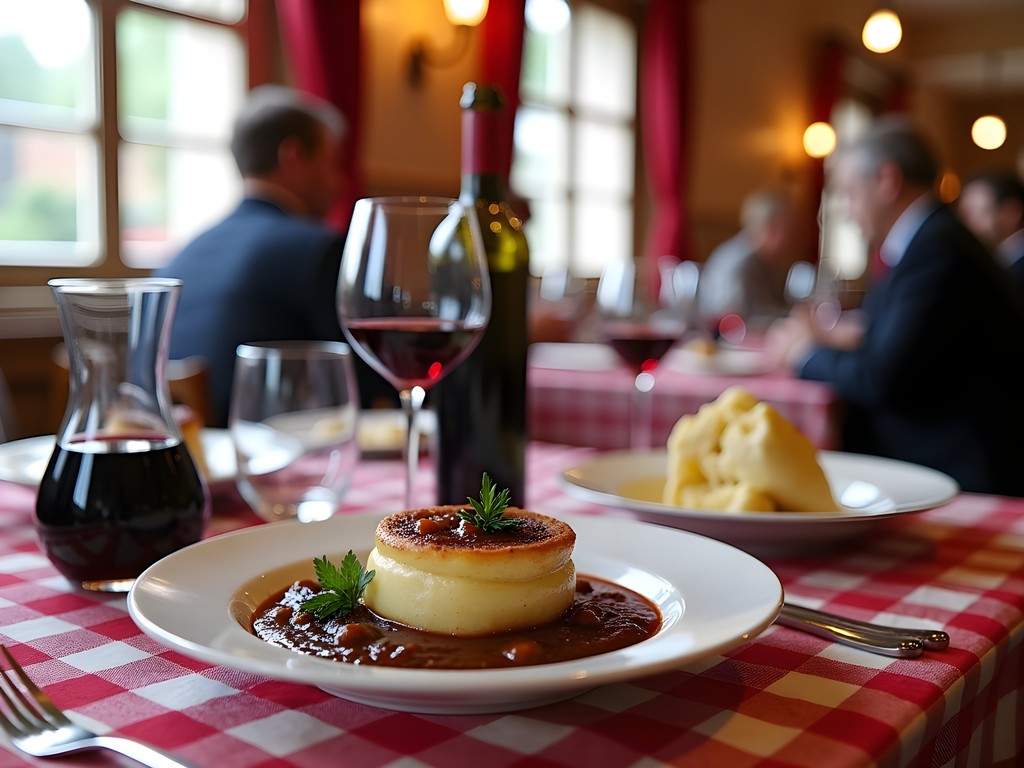
💡 Pro Tips
- Reserve lunch between 12:30-1:00 PM to experience the authentic rhythm of Lyon's midday dining
- Consider making lunch your main meal of the day—it's both economical and authentic
- Don't rush—a proper Lyonnaise lunch takes at least 90 minutes and often longer
Mastering the Art of Lyonnaise Cooking: Hands-On Culinary Experiences
For those who wish to bring Lyon's culinary traditions home, the city offers exceptional opportunities to learn directly from masters of Lyonnaise cuisine. On our fifth day, Elena and I participated in a half-day cooking workshop at L'Atelier des Chefs, where we joined a small group under the guidance of Chef Philippe, a former restaurant owner with thirty years of experience in Lyon's kitchens.
The session began with a guided tour of Les Halles, where Chef Philippe demonstrated how to select the perfect ingredients—from identifying properly aged Saint-Marcellin cheese to choosing the freshest pike for quenelles. Back in the teaching kitchen, we donned aprons and began the hands-on portion, learning to prepare three quintessential Lyonnaise dishes: a silky chicken liver terrine with Cognac, traditional pike quenelles with Nantua sauce, and a praline tart that captured Lyon's distinctive pink praline tradition.
What distinguished this experience was Chef Philippe's emphasis on technique rather than mere recipe following. He demonstrated how to properly deglaze a pan to extract maximum flavor, how to achieve the perfect consistency in a quenelle mixture, and how to detect when a sauce has reached its ideal thickness by the way it coats the back of a wooden spoon—all skills that translate to cooking far beyond these specific dishes.
For serious home cooks, I recommend bringing a digital kitchen scale in your luggage. French recipes typically measure ingredients by weight rather than volume, and having a compact scale allows you to accurately record the proportions used during cooking classes for reliable reproduction at home.
Beyond formal classes, we discovered that many chefs in Lyon are surprisingly generous with their knowledge. At Café Comptoir Abel, after expressing genuine interest in their cervelle de canut preparation, we were invited to observe the chef demonstrating his technique—a brief but valuable impromptu lesson that highlighted the pride Lyonnaise chefs take in their culinary heritage and their desire to see it perpetuated.
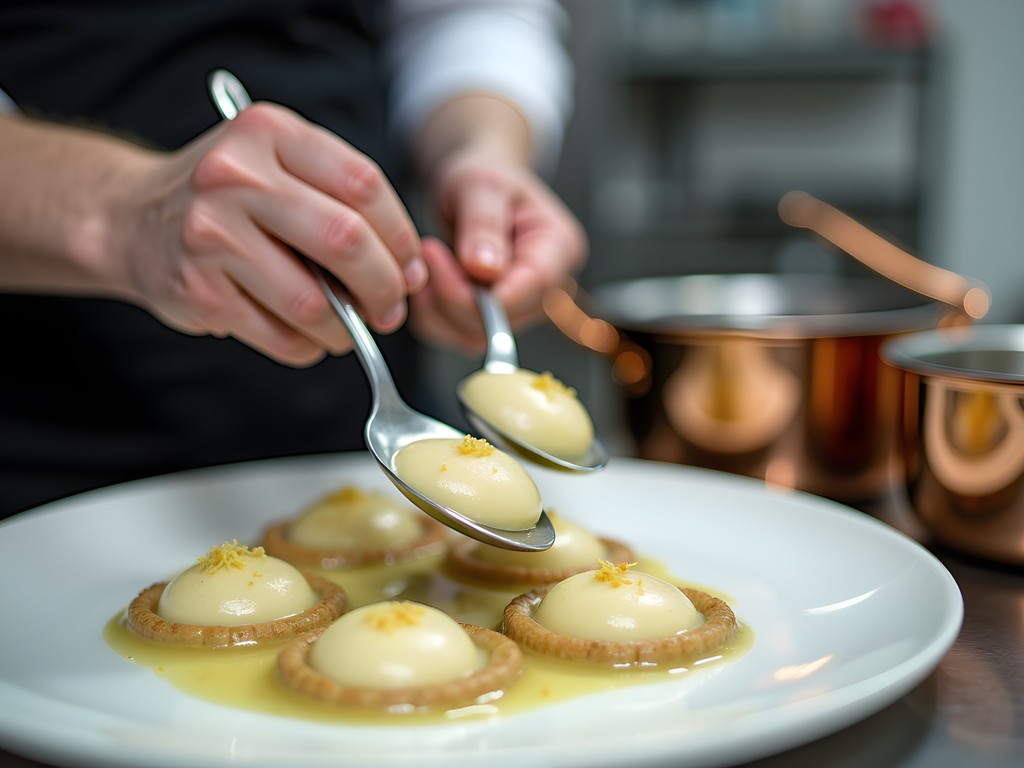
💡 Pro Tips
- Book cooking classes at least three weeks in advance—the best ones fill quickly, especially in fall
- Choose classes that include market tours for the complete field-to-table experience
- Take detailed notes on techniques rather than just ingredients—it's the methods that make Lyonnaise cuisine distinctive
Final Thoughts
As our week in Lyon drew to a close, I found myself reflecting on why this city maintains such a powerful hold on those who appreciate the profound connection between food, culture, and place. While Paris dazzles with innovation and Provence seduces with Mediterranean simplicity, Lyon stands as the beating heart of French gastronomy—a place where tradition and innovation coexist in remarkable harmony. Whether you're savoring the rustic perfection of a traditional bouchon, experiencing the refined brilliance of its Michelin-starred establishments, or simply enjoying a perfectly ripened Saint-Marcellin cheese from Les Halles, Lyon offers an unparalleled education in what makes French cuisine so enduringly significant. As the autumn light bathes the Saône in golden hues and the smell of simmering stock wafts from restaurant kitchens, I invite you to discover your own Lyon—to create food memories that will sustain you long after you've returned home. After all, in Lyon, a meal is never merely sustenance; it's an affirmation of what makes life worth living.
✨ Key Takeaways
- Lyon offers the perfect balance of traditional bouchons and innovative contemporary restaurants
- Fall is ideal for visiting when seasonal ingredients like mushrooms, game, and new Beaujolais enhance the dining experience
- Embracing the long lunch tradition provides both economic value and cultural authenticity
📋 Practical Information
Best Time to Visit
September through November
Budget Estimate
$300-500 per day for luxury dining experiences and accommodations
Recommended Duration
5-7 days
Difficulty Level
Beginner

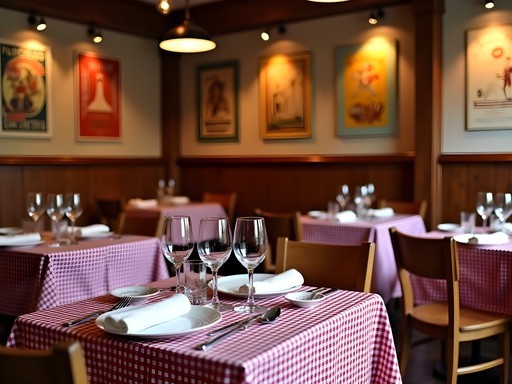
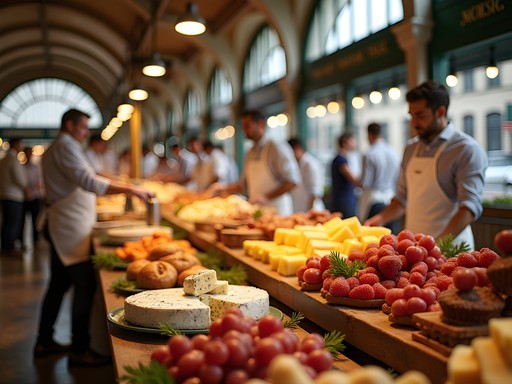
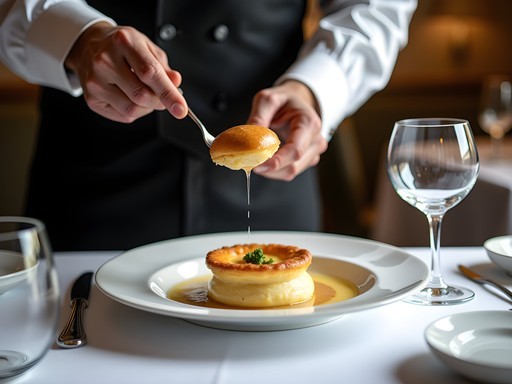
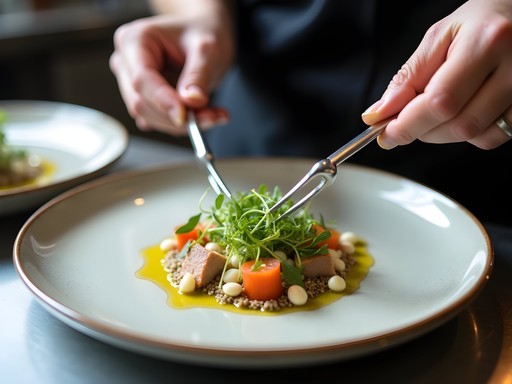
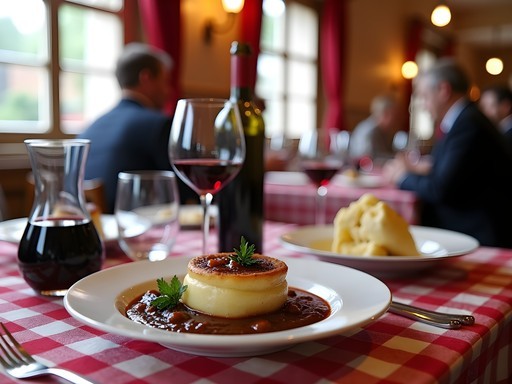
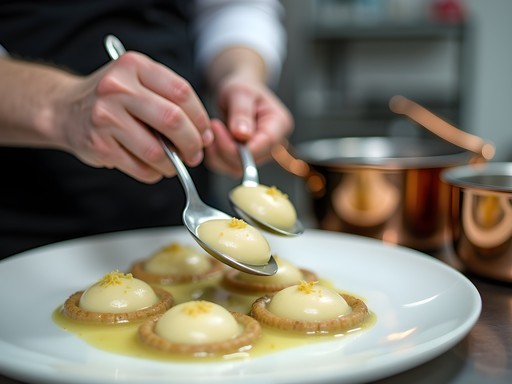


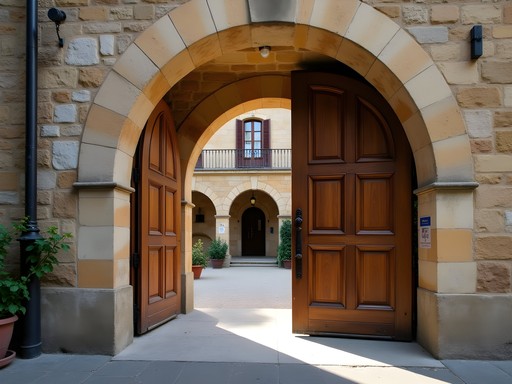
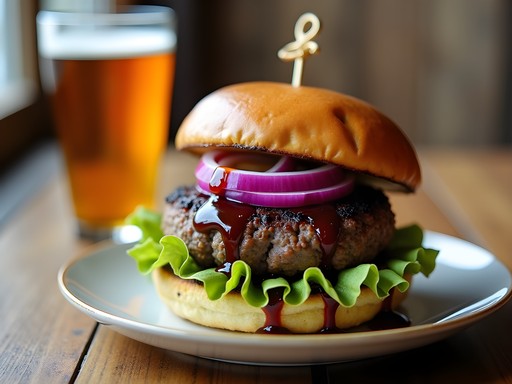
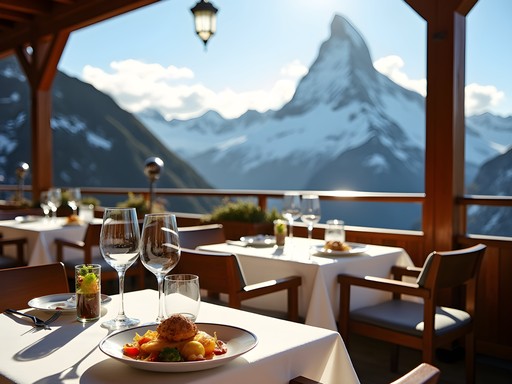
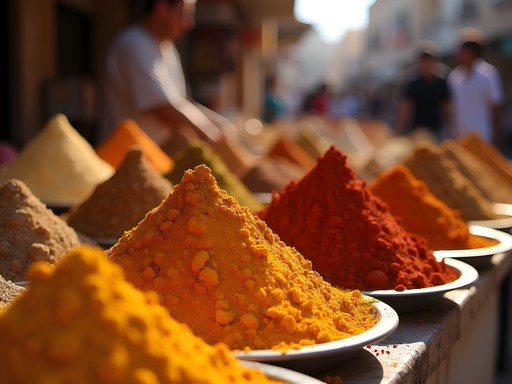
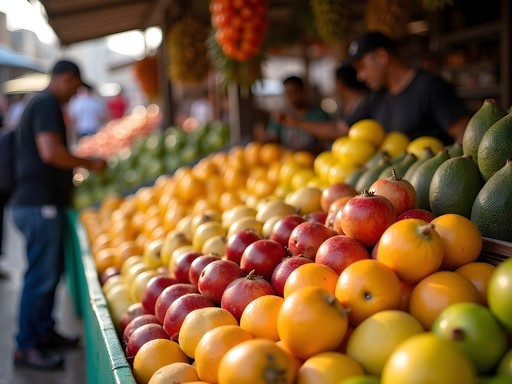
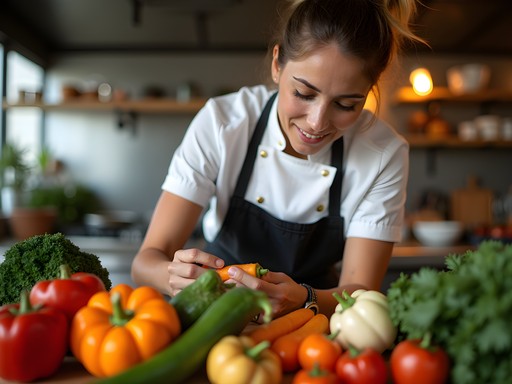
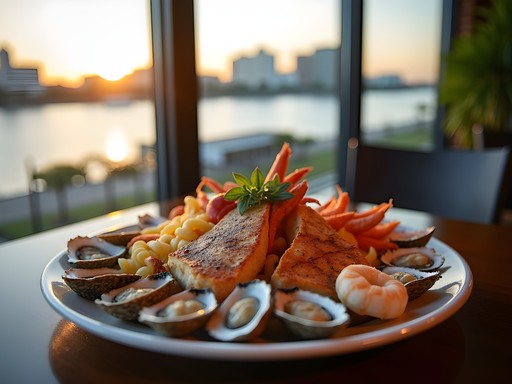
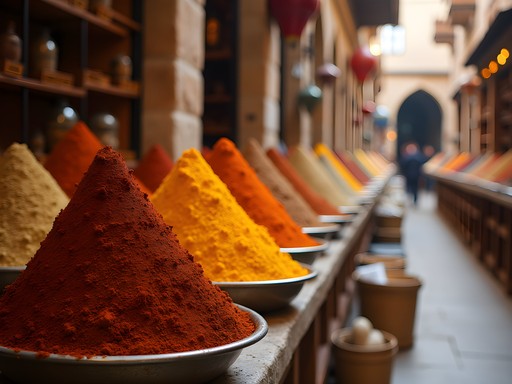
Comments
travelwithjames
Pro tip for anyone visiting Les Halles: go early (around 9am) on weekdays to avoid crowds and see the chefs from local restaurants selecting their ingredients. It's like a masterclass in ingredient selection!
Taylor Moreau
Excellent advice. I'd add that Sundays can be quite the experience too, though crowded. The atmosphere is electric with local families enjoying their traditional weekend meals.
frenchfoodie22
Those photos of the praline tart made me so hungry! Classic Lyon dessert!
happywanderer
Just got back from Lyon and this post would have been SO helpful before I went! We stumbled into Les Halles by accident and spent 3 hours just wandering around sampling everything!! The cheese at Mère Richard was life-changing! 😍 We also splurged on lunch at Paul Bocuse's restaurant and while expensive, it was worth every euro for a once-in-a-lifetime experience. One tip for anyone going: we found this little food guide that helped us understand all the local specialties. The cervelle de canut descriptions in menus had me confused until I read up on it!
exploreguy
How much was lunch at Bocuse? Trying to decide if I can fit it in my budget!
happywanderer
We paid about 175€ per person for the full experience with wine pairings. Definitely a splurge but honestly, the red mullet in pastry crust alone was worth it!
Taylor Moreau
Noah, your article perfectly captures Lyon's culinary essence. Having visited for business frequently over the past decade, I've developed quite an affinity for the quenelles at Café des Fédérations. The unpretentious atmosphere of bouchons is what makes Lyon so special - it's haute cuisine without the stuffiness. I always tell colleagues that understanding the 'machon' tradition (morning meal with wine) gives you insight into the Lyonnaise spirit. Did you happen to visit Café Comptoir Abel? Their pike quenelle in Nantua sauce is arguably the best in the city.
Noah Duncan
Taylor, I did visit Abel on my second-to-last day! You're right about that quenelle - absolutely transcendent. I've yet to experience a proper machon though - that's on my list for next time.
exploreguy
Great post! I'm heading to Lyon next month for just 3 days. If you had to pick just ONE bouchon to visit, which would it be?
Noah Duncan
Thanks! For a truly authentic experience, I'd say Daniel et Denise on Rue de Crequi. Reserve ahead - it fills up fast!
exploreguy
Perfect, thanks Noah! Just made a reservation.
explorelover
Those quenelles look amazing! Adding Lyon to my bucket list right now!
happyphotographer
Do it! And don't miss the praline tarts - bright pink and addictively sweet!
Oliver Duncan
Noah, your post brought back so many memories! I backpacked through France last year on a tight budget but splurged for one meal at a bouchon in Lyon. The tablecloth was checkered, the wine came in a small pitcher, and the owner kept bringing out more food than I ordered! I found that even as a budget traveler, Lyon offered incredible value. The Saint-Antoine market along the Saône was perfect for assembling picnic lunches with local cheeses and charcuterie. For those interested in Lyon's culinary history, the free walking tour that starts in Place Bellecour covers the traboules (hidden passageways) where you'll find some historic restaurants tucked away. The food scene in Lyon feels more authentic and less pretentious than Paris, though both are magnificent in their own ways.
gastro_nomad
Pro tip: Les Halles is actually less crowded on weekday mornings than weekends. We went Tuesday at 9am and had the place almost to ourselves!
lyon_lover
This is so true! Weekends are insane there.
travelgal
This makes me want to visit Lyon so badly! I'm planning a France trip next year but was mostly focused on Paris. Worth spending 3-4 days in Lyon instead? Also, are the Michelin restaurants super expensive or are there affordable options?
Oliver Duncan
Absolutely worth it! I'd actually recommend 3 days Lyon, 4 days Paris if you're into food. The Michelin places vary widely - lunch menus can be surprisingly reasonable (€40-60) while dinner tasting menus climb quickly. But honestly, the bouchons Noah mentioned offer the best bang for your buck. I used food guide to plan my eating itinerary and it was spot on for Lyon's highlights.
coffeefan
Just booked our tickets back to Lyon for spring! This post has me counting down the days!
dreamwalker1136
You're so lucky! Make sure to try Daniel et Denise if you haven't been. Chef Joseph Viola's pike quenelles are incredible.
Venture X
Premium card with 2X miles, $300 travel credit, Priority Pass